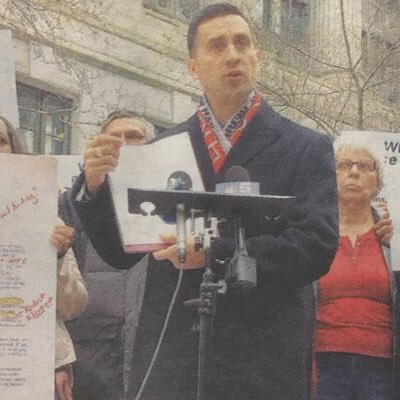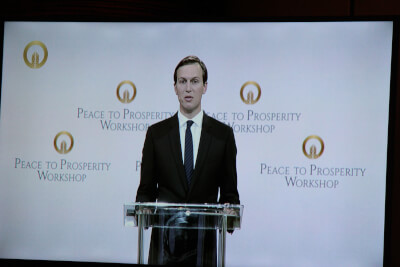Guest Op-Ed: Samaritan Values in understanding the facts in the Israel-Palestine conflict
By Froy Jimenez

As a World History teacher, one of the major skills I encourage students to develop is a balanced, evidence-based position on complex topics. Politics in the Middle-East is complicated to say the least. To be more specific, the topic of territory and political control between Israel and Palestine in that area is definitely worth a balanced discussion.
Yet, beyond trying to figure out who the land belongs to and how it should be divided politically, the more pressing discussion is how centuries of conflict on this topic continues to generate oppression, violence, and how it fuels hatred here in the U.S.
As an immigrant from Mexico, now U.S. citizen and a devout Catholic from Chicago, I was intrigued recently by a homily from our local pastor which illuminated the story of the “Good Samaritan” as a clear example of unity, avoiding being bystanders and choosing to help those most in need regardless of race or creed. The Palestine-Israel political dilemma in the Middle-East is often misunderstood and has increased the anti-semitism in this country and pushed Americans to be less like the “Good Samaritan” and fueled more and more hatred.
The word “anti-semitic” itself is often only used to describe hostility towards Jewish people and although that is partially true, it actually originates from the term “semitic” which according to Merrian-Webster can be defined as, member of any of a number of peoples of ancient southwestern Asia including the Akkadians, Phoenicians, Hebrews, and Arabs or a descendant of these peoples speaking a Semitic language.
So the correct use of anti-semitic is discrimination to any person from the semitic area, including Jews and people from Palestine. Ironically, Ancient Samaria, is actually located in present day West Bank of the Jordan River, where Israel and Palestine continue to battle for this territory.

Most recently, the Trump Administration under the direction of White House Advisor, Jared Kushner, the President Trump’s son-in-law, who happens to be Jewish, sponsored a conference in Bahrain to propose deal to accommodate tensions in the area.
The Trump administration has already made several key foreign policy decisions in this area, all of which seem to favor Israel, including the U.S. recognition of Jerusalem as the new capital of Israel, previously Tel Aviv, moving the U.S. embassy to Jerusalem, downgraded the Palestinian consulate, shut down the Palestinian office in Washington D.C. and cut foreign aid to Palestinian areas.
The “Peace to Prosperity” proposal by Kushner, consisted in the U.S. sending roughly $50 billion in economic incentives to Palestine so long as Palestine agrees to share the West Bank territory with Israel. Palestine wants to have its own independent country and therefore not entertaining any economic aid without first settling on a political arrangement, and not just a bribe.
Our country’s foreign policy decisions on this topic, appears one-sided. Add the fact that President Trump also recognized Israeli sovereignty of Golan Heights, another area of tension, and that Israel will name a town in that area, Ramat Trump, in his honor. A recent poll from the American Jewish Committee reported that President Trump is very popular among people in Israel with a 79% approval rating, mostly attributed to his foreign policy decisions in the area.

All this makes many people question the impartiality decision-making of U.S. government in the Holy Land, and most importantly causes people in the U.S. to develop anti-semitic views based on actions and topics that are far away from our shores. In other words, Jewish-Americans get blamed for the political decisions of Jews in Israel and Trump’s obvious bias towards Israel.
Another recent factor inciting Americans are the comments by U.S. Congresswoman Ilhan Omar (D-Minnesota) implying that American politicians in the U.S. Congress support Israel only because of the substantial contributions by Israel to U.S. lawmakers.
The Center for Responsive Politics estimates that the Israeli government spent $34 million on lobbying in Washington since 2017. This is ironic, since 71% of American Jews have an unfavorable opinion of President Trump according to by a survey conducted in May of this year. So while President Trump is widely popular with Jews in Israel, he is not very favorable by Jewish-Americans in his own country. Clearly there is a big difference in affinity towards Trump and his policies.
More importantly, often times Jewish people in the U.S. get painted with the same brush as Jewish in Israel, and often times Jewish people in U.S. get blamed for the policies of President Trump and the Israeli government. And while there is a connection between the State of Israel and Jewish people, they are not exactly one in the same. There has been a spike in Anti-Jewish crimes in America and that’s very unfortunate but it is worsened by co-mingling a political state with a religion. Also worth noting is that there is another set of troubles and oppression happening to people of Palestine.
The Palestinian communities in the Middle-East, particularly in the West Bank, Gaza and surrounding areas live in dire conditions in desperate need of help. The United Nations continues to try to serve as a neutral, unbiased, mediator but there continues to be little to no progress between Palestinian-Israeli relations. As neighbors in the Holy Land, the example of the “Good Samaritan” does not play out very much in Middle-East and after centuries of this dilemma, this is not not a surprise.
What is surprising is that there is conflict, hatred and Anti-Semitism, Anti-Jewish, Anti-Arab sentiments in this country. Our country is being polarized as it is by domestic politics any further factors only fuel more disunity. As a History Teacher, I have and will continue to partner with the Facing History organization which educates and advocates for being “Upstanders” when witnessing injustice, discrimination, and inequity. Facing History does a wonderful job of explaining among other things how bigotry and the horrors of the Holocaust took place. More importantly it applies those lessons to our world today.
The story of the “Good Samaritan” and the lessons in altruism mirrors these values and should be a constant reminder that here in America we can do better to fight the urge to buy into divisiveness, polarization, and hatred. Instead we can recognize and do something about injustice in our own country and educate others to eliminate Anti-Semitism, Anti-Immigrants, and any other negativity that takes the United out of our United States.
(Author Froy Jimenez is a Chicago Public Schools teacher who teaches World History, and a candidate in the 1st Illinois Senate District. Follow him on Twitter at @FroyforILSenate.)


- Israelisnipers shooting and killing hospital workers in Gaza - December 11, 2023
- CAIR Condemns Israeli Executions of Wounded, Unarmed Palestinian in West Bank - December 11, 2023
- Arab and Muslim American voters face a “simple choice” between Biden’s inhumanity and Trump’s edgy politics - December 9, 2023
























